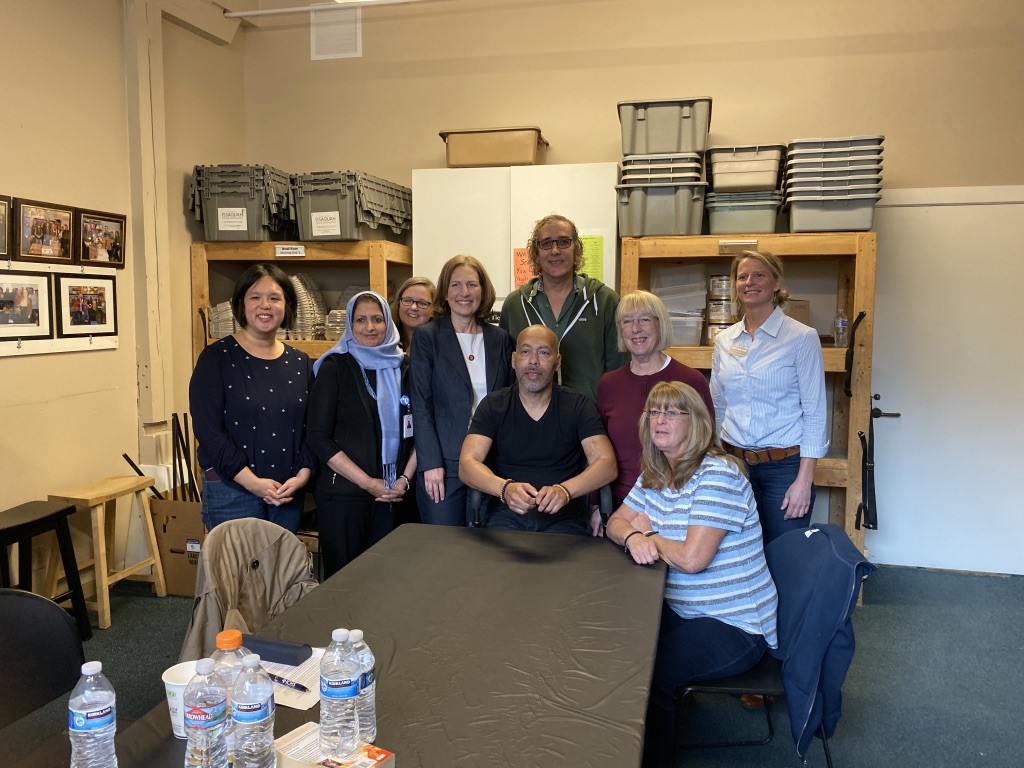By Cori Walters
Fall 2019

On October 3rd, Washington State Senator Patty Murray and Representative Kim Schrier visited the Issaquah Food & Clothing Bank to have a round table discussion about the proposed budget cuts to the federal Supplemental Nutrition Assistance Program (SNAP), otherwise known as the food stamp program. The Issaquah Reporter did a great job sharing the meeting facts and data regarding the impacts of the potential cuts.
These restrictions will negatively impact more than 3 million people nationwide, and 60,000 children and 15,000 seniors in Washington state alone would lose SNAP benefits.
It was a huge privilege to host the discussion at our facility and to share a space with such supportive leaders and public policy advocates. Included in this conversation were a few of our own food bank shoppers, who are most-likely to be impacted and understand first-hand how these new restrictions will impact those in similar positions as themselves. The immediate goals of this dialogue were to increase our collective understanding of how making cuts to SNAP would impact our food security system, to educate our community about how harmful these cuts actually are, and to share stories that evoke empathy and a deeper understanding of what it’s like to not have enough food or be food insecure.
Preventing federal cuts to SNAP is an adaptive challenge, which means there are either no known solutions or there are too many potential solutions with no clear direction. Adaptive solutions challenge an individual’s values and require a change in thinking, attitude, and norms. In order to work through an adaptive challenge, a change in mindset needs to occur. Diverse stakeholder groups need to be included in the conversation and there needs to be an analysis of the system that helps maintain the status quo.
With one group focused on making federal level financial cuts and another group focused on maintaining our social network for our most vulnerable community members, how do we begin to change the mindsets on such polarized topics?
I think that we start by asking more questions rather than believing that we already have all the answers. The most meaningful part of welcoming Senator Murray and Representative Schrier was that it marked the beginning of gathering key stakeholders and seeking mutual understanding. I appreciate our local politicians asking the Issaquah Food & Clothing Bank’s staff and clients clear and open questions like, “What would life be like without SNAP?”, “How would SNAP cuts impact food bank visits, resources and supplies?”, and “What role does SNAP play in your weekly food purchasing and what would happen if you didn’t have it?”
How can we possibly solve such big federal issues without asking the people and agencies who would be most impacted by the change? We can’t! But it’s clear the burden of the impact will land squarely on the shoulders of those who rely heavily on these benefits and the nonprofits that fill the gaps that those benefits can’t fill. The less help people receive from the federal government, the more help they will seek from local nonprofit organizations to ensure their needs are being met.
The questions I keep asking myself are, “What problem are we trying to solve?” and “Is cutting funding to feed children and seniors the actual solution?” I’m open to change when I know all the right voices are being heard and understood, when the unintended consequences are being flushed out, and when there are no broad stroke decisions being made as a way to solve only one aspect of the problem. The trickle down effects of cutting SNAP without a clear back up plan is dangerous to the families we serve and is likely to create a huge burden for nonprofits across America.
In closing, I’d like to thank Senator Murray and Representative Schrier for being proactive in this nationwide policy change at a local level and for asking questions that will help move the conversation in the right direction!